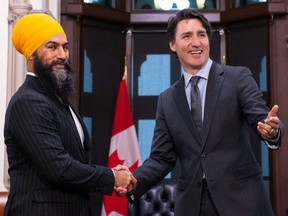32% of respondents say their opinion of Singh and the NDP is worse since 2022 when the deal was signed, while just 20% say they think better of the party and its leader now

Article content
OTTAWA — Just four out of 10 Canadians think the deal between the Liberals and the NDP to keep the Trudeau government in power has been a good thing, with even 40 per cent of New Democrats unconvinced of the value of the agreement, a new poll suggests.
Two years after the Liberals and NDP signed their supply-and-confidence agreement that props up Prime Minister Justin Trudeau’s minority government, Canadians appear to be fairly evenly split on if it’s been a good thing (38 per cent) or bad thing (37 per cent) for the country, according to the Postmedia-Leger monthly politics poll for June.
Advertisement 2
Article content
One-quarter of respondents still don’t know what to think after two years of the arrangement, the poll suggests.
Unsurprisingly, Liberal respondents overwhelmingly (84 per cent) think the deal has been good for Canada, while Conservative respondents almost equally overwhelmingly (75 per cent) think it’s been bad.
But Léger executive vice-president Andrew Enns says the more surprising finding is that NDP voters’ support for the deal is relatively soft given that party leader Jagmeet Singh has hailed the arrangement as a way to get New Democrats’ priorities enshrined into Liberal policy, such as recent bills offering government-paid dental care, birth control and diabetes medication.
While 60 per cent of New Democrats say that the deal is good for Canada, 40 per cent either aren’t sure (29 per cent) or even think the agreement has been bad (11 per cent).
“There’s more than a few NDP supports out there going: ‘I’m not so sure we’re getting full value on this’,” Enns said, noting overall support for the deal is “less than enthusiastic.”
“There’s a bit of a debate around the continuation of the supply-and-confidence agreement, and I think it goes straight to the overall polling numbers,” he added. “The Liberals we know are concerned about where things are trending, but I think even if you’re an NDP MP you’re a bit concerned.”
Article content
Advertisement 3
Article content
The perception of Singh and the NDP has also sunk in Canadians’ eyes since the deal was struck, with 32 per cent of respondents saying their opinion of Singh and his party is worse since 2022, whereas just 20 per cent say they think better of the party and its leader now.
Recommended from Editorial
The poll also shows that Pierre Poilievre’s Conservatives still hold a comfortable lead over Trudeau’s Liberals, though the prime minister’s party managed to gain a few points in the last month.
The latest survey puts the Conservatives at 41 per cent, compared to 42 per cent in last month’s Postmedia-Leger politics poll. That puts them 14 per cent over the governing Liberals at 27 per cent, a four-point increase from where the Liberals were in May.
The NDP’s support remains mostly unchanged at 17 per cent.
Trudeau’s favourability ranking also increased by three points to 19 per cent, while Poilievre’s dropped by two points but still remains higher at 26 per cent.
Advertisement 4
Article content
Though the Liberals’ support climbed four per cent between May and June, Enns says there’s still no reason for Trudeau to celebrate.
He noted the chatter among voters as they start summer will be the Liberals’ astounding loss in the Toronto—St Paul’s byelection.
“The timing is not great because I think that’s going to be the talk of the barbecue season for the Liberals. What’s Justin Trudeau going to do? Or is he going to go?” Enns said. “The summer may not be very good for them, because… they’re going in on a fairly negative note.”
The poll also shows that all parties face a concerning lack of trust in election results among gen Z and younger millennial voters, which could affect their willingness to turn out for the next general election.
While 68 per cent of all poll respondents say they “generally trust” election results in Canada, that number drops to 55 per cent among 18- to 34-year-olds. All parties, but particularly the Liberals, have spent considerable time and effort courting those voters over the spring.
“(Parties) twist themselves into knots about policies that are going to connect with this age group, because we want them to care, we want them to come out and cast a ballot. Maybe there needs to be a reset… and say our electoral system is sound, it works well,” Enns said.
Advertisement 5
Article content
Part of that distrust may come from ongoing discussions about the threat posed by foreign interference in Canada’s democracy, Enns noted.
The poll suggests 31 per cent of respondents think potential interference is such a threat that it “greatly compromises” an election’s legitimacy. Another 41 per cent say the effect is “somewhat limited” and ultimately “does not really” affect the overall result.
“I think it’s problematic,” Enns said. “You have 31 per cent who think the last couple of elections weren’t good and aren’t really seeing real concrete action that it’s not going to happen again.”
The poll was from an online panel with a sample of 1,607 of Canadians 18 and over. A random poll of the same size would have a margin of error no greater than plus or minus 2.45 per cent, 19 times out of 20.
National Post
cnardi@postmedia.com
Get more deep-dive National Post political coverage and analysis in your inbox with the Political Hack newsletter, where Ottawa bureau chief Stuart Thomson and political analyst Tasha Kheiriddin get at what’s really going on behind the scenes on Parliament Hill every Wednesday and Friday, exclusively for subscribers. Sign up here.
Our website is the place for the latest breaking news, exclusive scoops, longreads and provocative commentary. Please bookmark nationalpost.com and sign up for our politics newsletter, First Reading, here.
Article content







